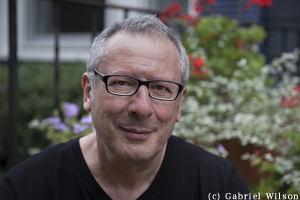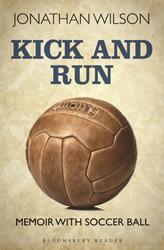Join a community of readers who are committed to Jewish stories
Sign up for JBC’s Nu Reads, a curated selection of Jewish books delivered straight to your door!
Jonathan Wilson’s most recent book is Kick and Run: Memoir with Soccer Ball, which was published in October by Bloomsbury Academic.
 Martin Fletcher: What position do you play and are you any good?
Martin Fletcher: What position do you play and are you any good?
Jonathan Wilson: I played always on the right wing. I am not as good as Zidane or Messi but I did once score six goals for Northwest London Jewish Boys Club against Stanmore and a hat-trick for St. Catherine’s College, Oxford against Balliol. My career came to an abrupt end when I tore my ACL during a game 13 years ago.
MF: We lived in the same London street and played in the same Jewish soccer league, yet soccer never meant as much to me as it did to you. Why does soccer remain so important for you?
JW: In the residual adolescence that remains part of my adult being, soccer rules. Beyond that I maintain an enduring passion for the game, especially when it is played at its highest level. Through playing, watching, coaching and reporting on soccer, I’ve met a world of fascinating individuals I might otherwise never have come across. A lifelong attachment to a sport (or sports) whether as spectator, or participant, isn’t particularly unusual. It doesn’t seem to be among the childish things that we’re supposed to put away. But I guess I’m dancing around your question, which is, “What’s in it for you?” To which I might answer soccer is not my religion but I am intensely and magnetically drawn to its houses of worship and the beauty of its rituals.
MF: Is the soccer motif a metaphor for your life? For instance, you quote Albert Camus: “All that I know about the morality and duty of man I learned from football. (soccer)”
JW: No, not a metaphor for my life, but certainly an enhancement of it. Camus was a goalkeeper, so, if he played for a good team, which he did, he had a lot of time to think while on the field. I’m not sure what I’ve learned from soccer, perhaps something about loyalty, its pleasures and its pain. I’ve never been able to understand why Americans frequently switch team allegiances when they move towns.
MF: I believe you came to America because you wanted to be a Jewish writer, which you felt you could not do in England. Is that true?
JW: Yes, that is true. I was enchanted by the ease with which Jewish- American writers entered the mainstream of American life and literature in the second half of the twentieth century and I felt, and still do, that a Jew can never really be English. But perhaps I’m wrong; after all a number of Jewish novelists have become very successful in England recently. Perhaps I am working from an old template.
MF: One reviewer has called you an “intellectual hooligan.” Do you like that epithet? And what does it mean?
JW: Well, this is advance praise from the writer Josip Novakovich and I thank him dearly for it. To be a disruptive force with the mind (rather, say, than on the terraces — I have never been thrown out of a game) is something that every writer craves.
MF: You write very intimately of your relationship with your parents, and not always kindly. There was something supremely painful in your father’s “I’m sorry, Doris” when he returned home from the mental hospital. Why did you need to be so honest?
JW: I don’t think I write unkindly of my parents. I hope not. I certainly didn’t intend to. I do describe certain acts of what I perceived to be exasperation on my mother’s part toward my father, but I also tried to represent the difficulties of her position as wife to someone with a long-term debilitating heart condition. I don’t think one can choose dishonesty in a memoir, or any other kind of writing, truth is preferable no matter how painful it might be to present. I have to show the experiences that marked me as a child. I can’t pretend that my father wasn’t in a mental hospital for a while or that the way he submitted to my mother didn’t upset me. In this regard no one’s behavior is a stain on his or her character, it is simply an inventory of human strengths and frailties.
MF: The London Premier League soccer team that you support, Tottenham Hotspur, is identified in England and elsewhere as a “Jewish” team. A rump of its own non-Jewish supporters call themselves “The Yids.” Can you talk about this unusual phenomenon?
JW: Sometime around the late 1980s or early 1990s, Tottenham Hotspur became indelibly identified with its Jewish supporters, a small minority of the team’s overall support. Rival fans had begun to heap anti-Semitic abuse upon the Spurs supporters. “Yids” certainly formed part of the vocabulary of insult. In time the Spurs fans executed the maneuver favored by many an abused group: they appropriated the insult that had been hurled at them and wore it as a badge of honor. “You want us to be The Yids,” the team’s working class non-Jewish supporters seemed to say, “OK, we’ll be the Yids — and screw you.”
Nowadays, everybody calls Spurs “The Yids”: the team’s supporters, its detractors, and neutrals. In February 2002 I flew back to London because Spurs had reached the final of one of England’s three major domestic football competitions, the League Cup. My nephew James and I traveled by train to Cardiff’s Millennium Stadium, where major games were staged while Wembley, London’s super stadium, was under reconstruction. I had not been to a live game for a long time, not, in fact, since before Spurs became “The Yids.” At first I was suitably freaked out. We got off the train and began the long march to the stadium flanked by cops and separated from the rival team’s  supporters. The Spurs fans began a warlike chant “Yids! Yids! Yids!” It was all a bit too Nuremberg for me. Then, inside the stadium, among 75,000 fans, a group of Tottenham supporters suddenly unfurled a huge Israeli flag. I asked my nephew, “Is this political?” “No,” he replied. “They couldn’t find Israel on the map.”
supporters. The Spurs fans began a warlike chant “Yids! Yids! Yids!” It was all a bit too Nuremberg for me. Then, inside the stadium, among 75,000 fans, a group of Tottenham supporters suddenly unfurled a huge Israeli flag. I asked my nephew, “Is this political?” “No,” he replied. “They couldn’t find Israel on the map.”
It all seems fairly benign but the name-calling can easily spiral out of control. At West Ham in East London recently, the crowd began to make gas-chamber hissing sounds when the Spurs players ran on to the pitch. The club was warned about its crowd’s racist and anti-Semitic behavior by the governing Football Association, and could face a hefty fine. Not long ago a petition circulated designed to press the Oxford English Dictionary to change its definition of a Yid from the familiar derogatory term for a Jew to “a Tottenham Hotspur football fan.” Now that would be something.
Martin Fletcher is the author of four books, most recently Jacob’s Oath. A five-time Emmy-winning television news correspondent who has worked for decades as the NBC News Bureau Chief in Tel Aviv, he is currently a Special Correspondent for NBC News. He won a National Jewish Book Award for his book Walking Israel in 2010.
Considered for decades the “gold standard of TV war correspondents” by Anderson Cooper, Martin Fletcher was an NBC News Correspondent and bureau chief in Tel Aviv for nearly thirty years. Fletcher has won five Emmys and a Columbia University DuPont Award — a Pulitzer for work in television — as well as awards from the Overseas Press Club and Royal Society of Television. Today, Fletcher’s work as an author is rapidly gaining an equally impressive reputation. He currently lives in Mexico and New York.